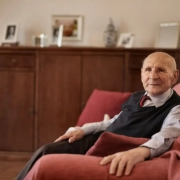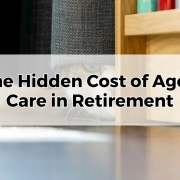Gifting Rules: Impact on Aged Care Fees and Pension
Table of Contents
ToggleWhen it comes to gifts and aged care fees and the age pension in Australia, there seems to be a lot of confusion. So, what’s the deal? How do gifts affect your eligibility for these benefits? Who decides how much those benefits are reduced, and how? Aged Care Financial Advisers here to clear things up.
When you think about transferring or gifting land to one of your family members, there are a few reasons why this might be on the radar. One major driver we see for moving ownership is tax optimisation (usually between spouse), and protection of assets. Other times people want their loved ones set up well when starting out in property ownership; and others still fear that future inheritance won’t go through smoothly without some legal help coming into play first!
Another reason is to try and get an advantage when it comes to the age pension or aged care fees. When we first speak with our prospective clients they often have a peculiar idea or suggestions from friends or family members on what they should do with their assets (or parents assets, as is often the case – we usually deal with a power of attorney).
Just give the house away, transfer it into someone else’s name, empty the bank accounts. These sorts of things. You could do that, but the impact is not what you might have hoped, and the amount of stamp duty the recipient might have to pay and capital gains the giver may be on the hook for can be substantial.
Read on for an overview of how gift giving could impact your age pension or DVA entitlements and your aged care means tested fees as you get older.
Can you give real estate as a gift in Australia?
It’s a common question – can you give real estate as a gift? The short answer is yes, but there are some important things to keep in mind.
Many people are surprised to learn that gifting real estate is a perfectly legal way to transfer property ownership in Australia. There are a few conditions that must be met in order for the gifting to be valid, but as long as these requirements are met, gifting real estate is a straightforward process.
- Gifting property is a serious financial decision and should not be undertaken lightly. You need to make sure that the giftee is prepared to take on the financial responsibility of owning the property.
- Gifting property may have tax implications, so it’s important to speak to a professional before proceeding. These include capital gains tax implications for the giver, and potential stamp duty obligations for the recipient of the gift.
- Gifting property is a legal transaction, so you’ll need to make sure all the paperwork is in order before going ahead. If you’re thinking of gifting real estate in Australia, just make sure you do your homework first.

What are the tax implications of gifting property?
Capital gains tax
Capital gains tax can have an impact on the financial situation of the person gifting the property. The ATO has rules on how capital gains tax is assessed when transferring property to family or friends.
If the property is gifted the CGT obligations are based on the market value of the property, not the amount paid (as it was gifted). Even if sold lower than market value, capital gains tax is calculated in this manner. A professional valuation will be required. Therefore, gifting a property to family or friends is not a successful way to avoid capital gains tax at all.
There are some situations where capital gains tax can be avoided or reduced when gifting a property if you are transferring:
- Your primary residence – main residence exemption
- Investment property – the 6 year rule
- Small business premises – small business 15 year exemption
- Property you purchased before CGT came into effect (September 20, 1985)
Stamp duty
In Australia, stamp duty on property transfer is a tax that is levied on the buyer of a piece of property. The stamp duty is calculated as a percentage of the purchase price of the property, and it is typically paid by the buyer at the time of settlement. When a property is gifted it is calculated at the market value of the property, and the same applies when sold ‘not at arm’s length’.
Every state has their own rules but as an example, here in Queensland transfer duty can apply even when no money is paid or the transfer is a gift. Victoria states transfers to relatives attract stamp duty even where the property is gifted and no money, or ‘consideration’ is paid. Much like Victoria, New South Wales offers an exemption for transferring to spouses and de facto relationship partners, but not other family is listed as an exemption. Each state also has their own rates of duty.

How do gifts affect the age pension?
Pensioners can give $10,000 each year and $30,000 in total over five years without it affecting their pension entitlements. This is called a gift. A gift can be cash, shares, furniture, or a house. If you give more than the allowed amount, it will affect your pension entitlement for five years.
If you give someone a gift that is worth more than the amount allowed, Centrelink/DVA will count it as a deprived asset. This means that you might lose some or all of your pension. Gifts given up to five years before you apply for an age pension are also assessed if they exceed the allowable limits.
What this means is that if you give away a property worth $500,000, Centrelink or DVA will still make an assessment that you have value of the property as an asset – less the amount you are able to give according to the rules described above. This means for 5 years they will value this gift at $490,000 as an asset (deprived asset) and deem an income from it even though it won’t produce one (as it is no longer the age pensioners asset).
If you give assets away over the limits in an attempt to gain access to an age pension, it is likely that it will not be a successful exercise until the time limit has expired.
Are all pensions impacted by gifting?
The gifting rules can be confusing, but they’re actually very simple. Non-means tested pensions like the blind age pension or War Widow’s pension benefits don’t get affected by these guidelines, and there is no financial benefit for gifting assets either as they will receive the full rate either way. They may still receive a means tested income support supplement that is impacted by the gifting rules.
How do gifts affect the age care fees (means tested fee)
Gifts that are counted as a deprived asset can impact aged care accommodation and care costs. So, what are the gifting rules and exemptions? And how do they apply in practice? The gifting rules are designed to prevent people from transferring assets for the purpose of avoiding aged care costs.
Gifts that are considered deprived assets include money, property, shares or managed investments. If you give away an asset within five years of entering aged care, the value of the asset will be included in your means test assessment. This could result in you paying a higher accommodation bond or care fee.
The $10,000 single year disposal free area applies to ALL assets disposed of during a financial year. The $30,000 5-year disposal free area applies to all assets disposed of during the current financial year and the previous 4 financial years occurring after 30 June 2002.
There are some exceptions to the gifting rules, including gifts to a spouse or special disability trust. If you’re thinking about giving a gift, make sure you check the rules first to see if it will affect your aged care costs.
The gifting will not impact the any fees except the means tested care fee, unless it is the reason for someone not qualifying as a low means resident, where it can impact the accommodation costs. For a full fee paying resident, the amount gifted will form part of the assets as a deprived asset for assessment both before entry and for their ongoing means tested care fees (until they reach the lifetime cap).
Are all gifts assessable for aged care fees and age pensions?
Gifts given to spouses are not assessed as all assets are pooled and split 50/50 and there is no benefit to be derived by gifting some assets to the other partner, even if one is staying home and the other entering care.
Special disability trusts may have a gifting exemption of up to $500,000 for eligible family members. This is one of the two significant benefits of a special disability trust.

Granny flat arrangements
A granny flat interest or right is where you pay for the right to live in a specific home for life. The property must belong to someone else. It’s not a description of the type of property. We may also call it a granny flat right. It must be:
- all or part of a private residence
- your principal home
- not owned by you, your partner or a trust or company you control.
The right only lasts for your lifetime. It’s not part of your estate when you die. If you pay more than the cost or value of your interest, then that’s an example if deprived assets. To assess this we use a reasonableness test and work out how much it would have been reasonable.
If you leave within five years, we’ll review the granny flat interest. If the reason for leaving is something you could expect when you created the granny flat interest, the gifting rules will apply. However, if the reason for leaving is something that was unexpected, the gifting rules may not apply. Unexpected reasons may include sudden illness, family relationship breakdown, elder abuse or property damage. So, if you’re thinking of gifting your granny flat interest, be sure to keep these things in mind.
Gifting can be a great way to help out your loved ones financially, but it’s important to understand the implications first. All gifts are not created equal in the eyes of the law- some may be subject to taxes, and many of them will affect means-tested benefits like the age pension and aged care fees.
If you’re thinking about making a gift above the limits, it’s best to seek professional advice first so that you know exactly what you’re getting into. Aged Care Financial Advisers can help you navigate these complex rules and make the best decision for your unique circumstances. Get in touch with us today to learn more.








